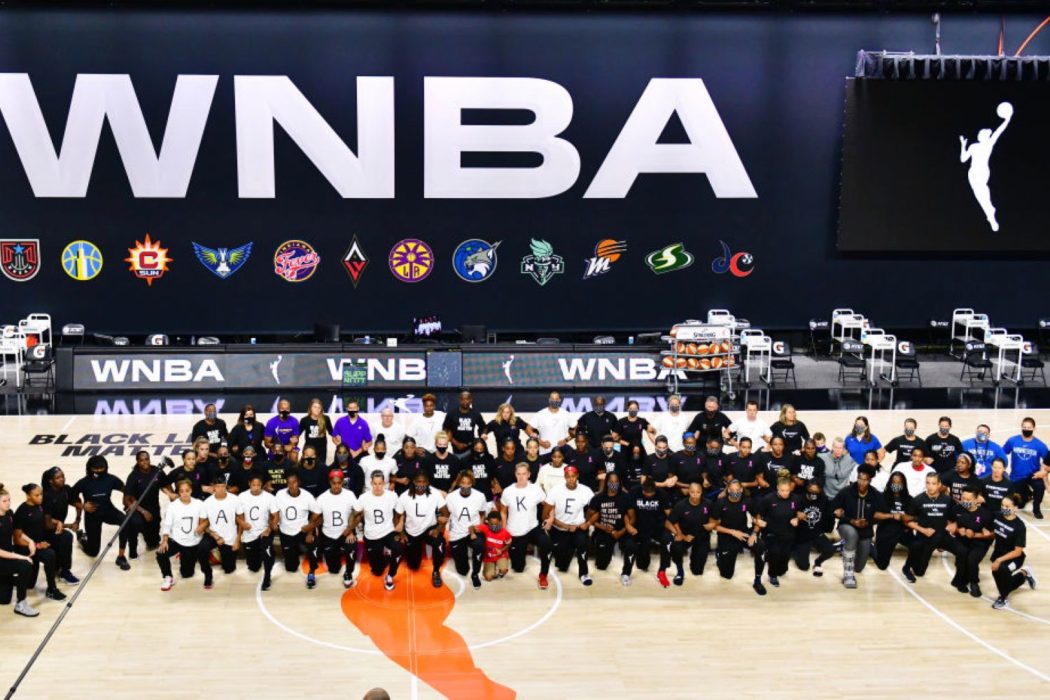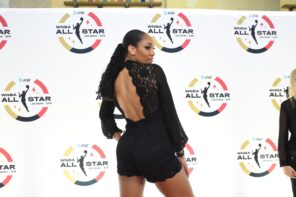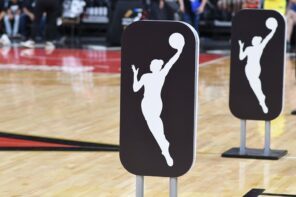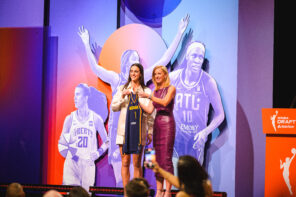The 2020 WNBA season was not only about the competition we saw on the court – not at all.
It was about furthering the conversation around police brutality and racial injustice. From painting “Black Lives Matter” on both courts to wearing Breonna Taylor’s name on the backs of their jerseys to protesting the shooting of Jacob Blake, the 2020 season, while secluded, may have been the most memorable in its 24-year history.
At the Women’s Sports Foundation’s 41st annual Salute to Women in Sports, rising journalism sensation Pepper Persley presented the New York Liberty’s Layshia Clarendon with the Wilma Rudolph Award on behalf of the entire WNBA.
Check out Pepper Persley’s interview with @layshiac, accepting the Wilma Rudolph Courage Award on behalf of The Players of the @WNBA! #SpeakWithSport pic.twitter.com/ypr0gsj6Mp
— Women’s Sports Foundation (@WomensSportsFdn) October 15, 2020
The @WomensSportsFdn Wilma Rudolph Courage Award goes to the @WNBA for their work on racial injustice.
“I fight for racial equality because I want that next generation to feel the same way.” – @Candace_Parker pic.twitter.com/6tvWEwjskL
— Yahoo Sports (@YahooSports) October 15, 2020
The introduction began with a video that was narrated by South Carolina women’s basketball coach Dawn Staley – and featured several from the WNBA family.
It speaks to the identity that we’ve always had as WNBA players, standing in unity and really amplifying our voices to foster change.
–Nneka Ogwumike, Los Angeles Sparks
The women’s players have always been there when it’s time to advocate for something, but they’re usually first.
–Jaren Jackson, Jr.
So after the players decided not to play that night and take a pause, it was a powerful display, I thought, of unity on national television. And we actually left the broadcast courts after the players had decided not to play and gathered for a really quickly put together but unbelievable candlelight vigil.
–Cathy Engelbert, WNBA commissioner
I want my nieces, my nephews, my daughter to know that they can do and be and dream to be anything they want to be. And they’re not going to be held back because of their race or because of their gender.
–Candace Parker, Los Angeles Sparks
In Clarendon’s interview, she expressed the meaning of the 2020 season being more than about wins, losses, points and rebounds.
It’s about courage. And so much of what we’ve done about this season has been the courage to stand up for other people, to stand up for other Black women, to stand up and people who have been victims of police brutality.
–Layshia Clarendon, New York Liberty
One of the successes that Clarendon talked about was the partnership with the African-American Policy Forum which allowed the stories of other Black women that do not always garner the headlines of a Breonna Taylor or Sandra Bland to be told. It was also important for Clarendon because it flew in the face of tired narratives that women are always at each other’s throats.
And particularly that the league full of women and non-binary people – umbrella term – for women that stand together when we’re sold so many narratives about women – that they’re catty, that they’re petty, that they don’t get along, that they drag each other down.
And you see that with our league that we’re not that.
–Layshia Clarendon, New York Liberty
What Parker talked about in the introduction to Parsley’s interview with Clarendon rings true across the WNBA because Clarendon also mentioned the significance of the fight for social justice. It is about paving the way for the next group of girls that will follow the Clarendons, Parkers, Ogwumikes and others to use their voices as well.
Like, seeing you on here just gives me so much joy that you’re covering the WNBA, you know our stories, that you’re involved. It’s like seeing what the next generation is going to bring from a grassroots level that you all are the future.
And so in the same way that I’ve gotten this league passed down to me from the greats of, like, Rebecca Lobo and Tamika Catchings and Ticha Penicheiro and, you know, Sue’s still in the league – kind of passing the time. That’s our hope is that, like, we pass that down.
–Layshia Clarendon, New York Liberty




